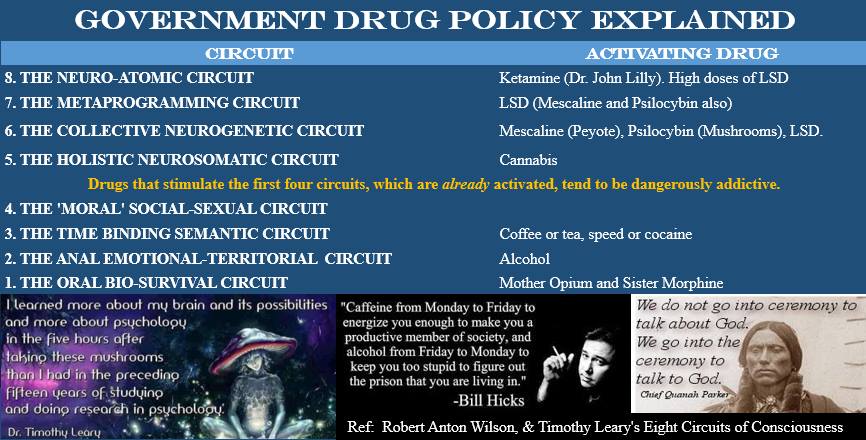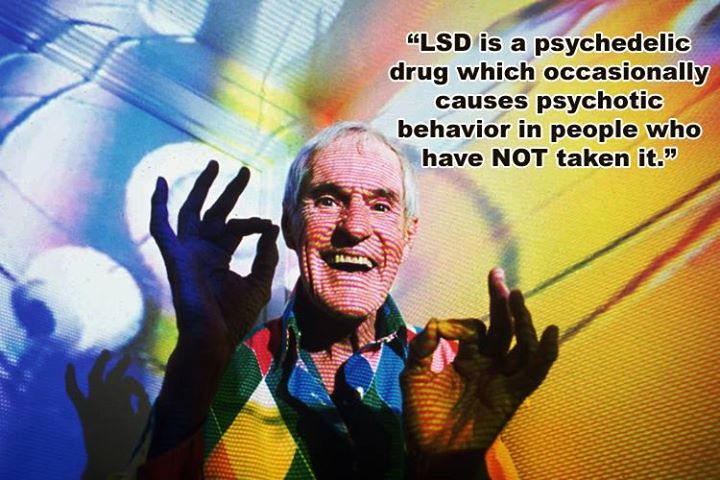
Timothy Leary's Eight Circuits of Consciousness
Timothy Leary
Psychedelics
[Whatever Leary's connection to the CIA and it's LSD agenda, he wrote one or two of the best books ever written on Psychedelics, and opened millions of people up to the internal reality. And he was a greatly enjoyable writer to read. His books The Politics of Ecstasy and Neuropolitics are classics to rank alongside John Lilly's book The Centre of the Cyclone as mind blowing reading material. He also spent 4 1/2 years in jail for cannabis possession.]
Lords of the Revolution: Timothy Leary and the CIA,. . .The Spy Who Came In From the (Ergot) Mold By W.H. Bowart Well, one day he comes back to the cell with lines on his head. They were actually very precise measurement lines. His head was shaved and it was marked with all these careful, precise blue lines....They gave him a lot of those fright drugs. They kept him in solitary. They did everything they could to break his mind, and they succeeded....."Totally controlled him. They gave him a lot of those fright drugs. They kept him in solitary. They did everything they could to break his mind, and they succeeded. Look at him now..."
Tinker, Tailor, Stoner, Spy: Was Timothy Leary a CIA Agent? by Mark Riebling
Timothy Leary's Eight Circuits of Consciousness
Books
The Politics of
Ecstasy by
Timothy Leary
[1979] The Intelligence Agents by Timothy Leary
Quotes
ďRomantic poetry and fiction of the last
2000 years has blinded us to the fact that emotions are a low form of jungle
consciousness. Emotional actions are the most contracted, dangerous form of
fanatic stupor.Ē -T. Leary
"Beware of emotions. The emotional person is turned off sensually. His body is a churning robot. Emotions are addictive, narcotic, and stupefacient. Moods such as sorrow and joy accompany emotions. Like a junkie who has just connected, the emotional person feels good when he has scored emotionally, i.e., put someone down or been beaten down. Conscious love is not an emotion; it is the serene merging with yourself, with other people, with other forms of energy. Love cannot exist in an emotional state. Emotions are emergency alarms.....The presocial wily-animal god of emotion-locomotion resides within our nervous system, ready to pour out flight-fight endocrine juices (p97)."óT. Leary
"Most religions have been inspired by God the Moralist Dictator, who invariably banished the pleasures of sensuality, eroticism, individual luxury and free art. These taboos are comprehensible because a citizenry that pursues pleasure will tend to pay less attention to domestication and the self-sacrifice that benefit society. The Eastern and Mideastern empires reserved luxury, art, sensuality to the aristocracy.--T. L.
"In March 1980, the month in which these lines were transmitted, I was presented (under the usual dusty backroom circumstances) a volume purporting to be the long-awaited Fourth Secret Teaching of Gurdjieff. For the past twenty years, we Gurdjieff fans had been titillated by rumours of this Fourth Book, which supposedly listed secret techniques and practical methods for attaining the whimsical, post-terrestrial levels obviously inhabited by the jolly Sufi Master. We had always assumed, naturally, that the secret methods involved drugs. So it was a matter of amused satisfaction to read in this newly issued text that not only were brain-activating drugs the keys to Gurdjieff's wonderful, whirling wisdom, but also that the reason for keeping the alkaloids secret was to avoid exactly the penal incarceration which I was enjoying when the following essay was penned."--Tim Leary (Changing my mind among others p192/3)
Quotes re Leary
Leary supervised mind control experimentation at a CIA front in Berkeley, CA
for 15 years prior to his massive media promotion in the latter '60s. Leary's
role was to drug, distract and discredit the American anti-war movement. At the
same time, the Agency - after an Army study proposed using potent hallucinogens
for chemical warfare purposes - planted directions for the manufacture of LSD
and STP in academic journals accessible to the public. Lysergic acid was in
large part responsible for the decimation of the left in the '70s, just as
heroin would be used to destroy the Haitian Rastafarian movement - it took no
more than one year - a decade later. Hippies who defend Leary are wrong-headed
and have an unconscionable view of Vietnam-era progressive history, IMhO. The
drug's influence was destructive, and any "revelations" that came from it were
personal and subjective, like reading Proust, self-indulgent, politically
useless. -
AC
TRIP: One of the things that struck me in the book was your discussion of
Timothy Learyís work. Timothy Leary has kind of fallen out of favor in the
psychedelic scene. Itís not as fashionable right now to go back to the 8-circuit
model and say itís useful as a reference point. I found it really interesting to
see that brought back into play.
KJ: "Iím not really a fashionable person. Iíve really read an awful lot of what
Timothy Leary had to say. Iíve seen a significant part of what he predicted
coming true. He was into the internet at a very early stage (he had a company
called Knowhere), and he said that itís the new LSD, by which he meant itís the
new way of connecting with everything. A lot of his stuff has come true. I think
he was an extremely intelligent man. A lot of people donít realize that he was
essentially the father of transactional analysis. They associate the name Eric
Berne and Games People Play, but thatís why Leary was invited to Harvard,
because his Ph.D. thesis at Barclay was called ďThe Interpersonal Diagnosis of
Personality,Ē which was essentially setting out the basics of transactional
analysis, of how you are defined by your interpersonal interactions, almost an
existentialist idea if you like. He was a very original thinker about a lot of
things with a lot of very good ideas, and I think that the anti-Leary feeling,
which is of quite long standing, is that Learyís behavior somehow spoiled things
for other people that wanted to do psychedelic research. I think thatís a very
naÔve view." Dr. Karl Jansen
https://scotto.org/listing.php?id=178
Leary, who was associated with Harvard University, was initially hired by the CIA and military intelligence to develop conditioning drugs in order to make soldiers aggressive and that sort of thing. The aggression drug they use on soldiers today started with Timothy Leary. There were also experiments with truth serums, i.e. drugs that make people talk. The CIA and military intelligence has a vast drug section which Leary was heavily involved in. [2000] Music of Time by Preston Nichols
http://www.futurehi.net/people/timothy_leary.html
Timothy Leary - Official Website

Timothy Leary's Eight Circuits of Consciousness


http://forum.davidicke.com/showthread.php?t=16102
Timothy Francis Leary (October 22, 1920 Ė May 31, 1996) was an American writer,
psychologist, modern pioneer and advocate of psychedelic drug research and use,
and one of the first people whose remains have been sent into space. An icon of
1960s counterculture, Leary is most famous as a proponent of the therapeutic and
spiritual benefits of LSD. He coined and popularized the catch phrase "Turn on,
tune in, drop out."
Leary was born in Springfield, Massachusetts, an only child[1] of an Irish
American dentist who abandoned the family when Leary was 13. He graduated from
Springfield's Classical High School. Leary attended three different colleges and
was disciplined at each.[1] He studied for two years at the College of the
Holy Cross in Worcester, Massachusetts. Leary received a bachelor's degree
in psychology at the University of Alabama in 1943. An obituary of Leary in the
New York Times said he had a "discipline problem" there as well, but that he
"finally earned his bachelor's degree in the U. S. Army during World War II,"[1]
when he served as a sergeant in the Medical Corps. Leary, who later became a
counterculture icon and LSD proponent, dropped out of the class of 1943 at The
United States Military Academy at West Point. He received a master's degree at
Washington State University in 1946, and a Ph.D. in psychology at the University
of California, Berkeley in 1950[2]. The title of Leary's Ph.D. dissertation was,
"The Social Dimensions of Personality: Group Structure and Process." He went on
to become an Assistant Professor at Berkeley (1950-1955), a director of
psychiatric research at the Kaiser Family Foundation (1955-1958), and a lecturer
in psychology at Harvard University (1959-1963). He was officially expelled from
the faculty of Harvard for failing to conduct his scheduled class lectures;
however, his contribution to the spreading popularity of then-legal psychedelic
substances among Harvard students due to his research and other activities
played a large part in the move to dismiss him.
http://en.wikipedia.org/wiki/Timothy_Leary
The College of the Holy Cross is an exclusively undergraduate Roman Catholic
liberal arts college located in Worcester, Massachusetts, USA. Holy Cross is the
oldest Roman Catholic college in New England and one of the oldest in the United
States.
Opened as a school for boys under the auspices of the Society of Jesus, it was
the first Jesuit college in New England. Today, Holy Cross is one of 28 member
institutions of the Association of Jesuit Colleges and Universities and is part
of a consortium with other Worcester colleges, including Worcester Polytechnic
Institute and Clark University. On July 1, 2000, Rev. Michael C. McFarland, S.J.
became the current president of the college. As of June 2007, the Holy Cross
endowment was valued at $660 million.[1] http://en.wikipedia.org/wiki/College_of_the_Holy_Cross
http://www.holycross.edu/
Less well-known is the fact that Leary's college career began at Holy Cross.
Indeed, in some ways, his lifelong battle with authority was prefigured by his
tenure on Mount St. James.
Leary came to Holy Cross in the fall of 1938. Living on the fourth floor of
Fenwick Hall in room 38, he took courses in Latin, Latin composition, English,
English composition, religion, history, math and French. By his second semester,
according to Robert Greenfield's Timothy Leary: A Biography, Leary was taking
bets on sports events and running a continuous poker game. He did so well that
he was able to buy himself a car, which enabled him to explore the bars of
Worcester and pick up local girls. Soon he was traveling to Boston and New York.
It was at Holy Cross that he is said to have lost his faith in Catholicism.
The summer after his first year, Leary passed the entrance examination for West
Point and planned to spend the intervening time in New York. His mother
insisted, however, that he return to Holy Cross, and apparently his second year
was another one of little study and much drinking and womanizing. The College
has no records of Leary being disciplined, however, and his transcript simply
states that he voluntarily withdrew.
http://www.holycross.edu/departments/publi...7/GAA/gaa8.html
